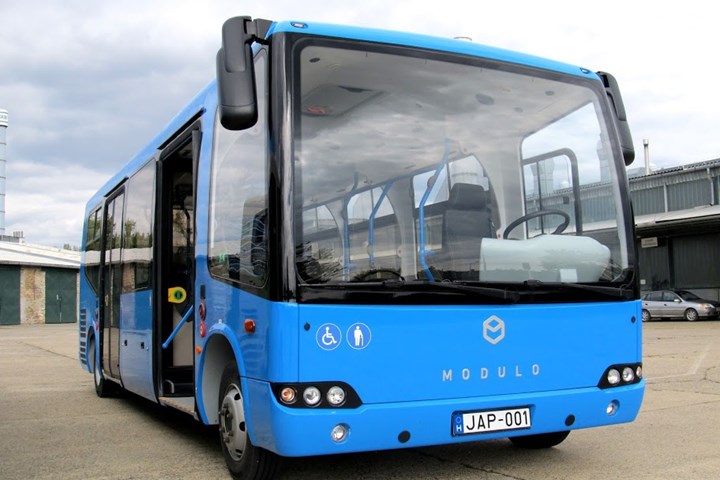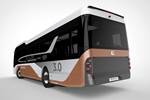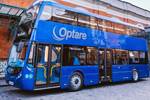Loop Energy supplies hydrogen fuel cell module to power Slovakian composite transit bus
Loop Energy’s proprietary solutions will deliver power and enable a smaller fuel storage system without compromising the weight or range of the eight-meter transit bus.

The Modulo is part of M&I’s composite platform. The transit bus incorporates a fully composite, self-supporting body. Photo Credit: Mobility & Innovation a.s. (M&I)
Loop Energy (Burnaby, Canada) a developer and manufacturer of hydrogen fuel cell-based solutions, has announced the order of the company’s S300 fuel cell module to Slovakia-based company, Mobility & Innovation a.s. (M&I), to fuel the electric powertrain of M&I’s new eight-meter transit bus as part of the company’s composite platform. This order is the first under the commercial agreement signed between the parties, which anticipates more than $1.9 million USD in fuel cell shipments from Loop Energy over the next two and a half years.
“This marks the start of a new era in Slovakian bus manufacturing,” says János Onódi, CEO and co-owner of M&I. “Combining our best-in-class lightweight composite body truck and our technology with Loop Energy, one of the best fuel cell platforms in the world, is a natural and exciting next step for us.”
M&I says it is the developer of a lightweight and zero-emission city bus platform, known for its zero emissions powertrain and industry-leading GVWR (Gross Vehicle Weight Rating) for a zero-emission transit bus vehicle. Manufactured with laminate composite materials, M&I buses are lighter than comparable steel vehicles. M&I says the low-curb weight enables greater passenger capacity, while still meeting even the most stringent of axel load requirements.
To further meet the need for both power density and fuel-efficient energy, M&I has selected Loop Energy to provide the company’s proprietary fuel cell modules. M&I notes that Loop Energy is able to deliver power and enable a smaller fuel storage system without compromising the weight or range of the bus. The fuel cell system will also aid in improved total cost of ownership for M&I’s customers.
“Mobility & Innovation’s M&I family of vehicles offers a great fit with both municipal and private bus fleet operators’ requirements. We are excited about being a part of the upcoming launch of the hydrogen electric model of the M&I bus,” says George Rubin, Chief commercial officer of Loop Energy. “Municipal transit is a great example of a vertical market with a very strong business case for hydrogen electric vehicles and as a result, we maintain a strong focus on establishing strategic partnerships with bus OEMs across the key geographic markets.”
Related Content
-
Composites end markets: Automotive (2024)
Recent trends in automotive composites include new materials and developments for battery electric vehicles, hydrogen fuel cell technologies, and recycled and bio-based materials.
-
Aptera reveals first composite production parts for BinC vehicle
Pre-production efforts are underway to begin building production-intent vehicles.
-
Envalior offers novel Tepex composite for EV battery housings
Low-thickness, recyclable thermoplastic composite passes strict thermal runaway tests for EV battery housings.













.jpg;maxWidth=300;quality=90)


